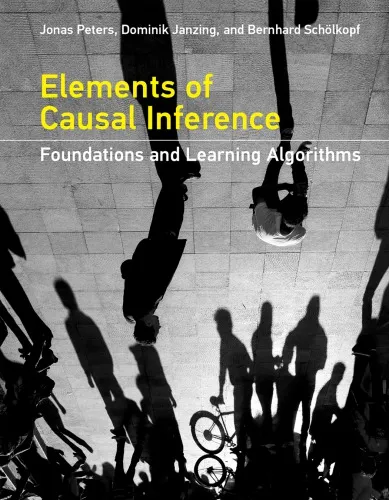Elements of Causal Inference: Foundations and Learning Algorithms
4.7
بر اساس نظر کاربران

شما میتونید سوالاتتون در باره کتاب رو از هوش مصنوعیش بعد از ورود بپرسید
هر دانلود یا پرسش از هوش مصنوعی 2 امتیاز لازم دارد، برای بدست آوردن امتیاز رایگان، به صفحه ی راهنمای امتیازات سر بزنید و یک سری کار ارزشمند انجام بدینکتاب های مرتبط:
معرفی کتاب "Elements of Causal Inference: Foundations and Learning Algorithms"
کتاب "Elements of Causal Inference: Foundations and Learning Algorithms" یکی از آثار برجسته در زمینه یادگیری causal inference است که به صورت جامع و عملی به مبانی فلسفی و الگوریتمهای یادگیری علیت پرداخته است. این کتاب نه تنها برای پژوهشگران حوزه یادگیری ماشین و آمار مفید است، بلکه برای کسانی که به دنبال کشف الگوهای پیچیده در دادهها هستند، منبعی باارزش بهشمار میرود.
خلاصهای دقیق از کتاب
در هر سیستم دادهمحوری، فهم ارتباطهای علی میتواند راهگشای تصمیمگیریها و پیشبینیهای بهتر باشد. نویسندگان این کتاب، Jonas Peters، Dominik Janzing و Bernhard Schölkopf، با تأکید بر پیوند میان ریاضیات و یادگیری ماشین، به تدریج موضوع علیت را توضیح میدهند. مباحثی همچون مدلسازی causal graphs، آزمونهای آماری برای تشخیص علیت، و استفاده از دادهها برای طراحی الگوریتمهای پیشرفته از موضوعاتی هستند که با جزئیات در کتاب پوشش داده شدهاند. این اثر همچنین به چالشهای کار با دادههای observational و تأثیرات ناشی از متغیرهای confounder میپردازد. نویسندگان تلاش کردهاند که مفاهیم پیچیده را با ارائه مثالها و تمرینهای متنوع سادهسازی کنند تا خواننده بتواند دانش نظری را به کاربرد عملی تبدیل کند.
نکات کلیدی کتاب
- توضیح دقیق و روشن درباره ساختار Causal DAGs (Directed Acyclic Graphs)
- آموزش روشهای آماری برای تشخیص رابطههای causation و correlation
- ارائه الگوریتمهای پیشرفته برای یادگیری causal inference
- بررسی دادههای observational و موانعی که این نوع دادهها ایجاد میکنند
- ترکیب insights از آمار، یادگیری ماشین و فلسفه برای کشف روابط علی
نقلقولهای معروف از کتاب
Correlation is not causation, but understanding where correlation fails provides insight into the underlying causal structure.
The challenge of causal inference lies in distinguishing direct causal influences from spurious correlations introduced by confounding variables.
چرا این کتاب اهمیت دارد؟
با افزایش حجم دادهها و پیچیدگی سیستمهای تحلیلی، نیاز به روشهای دقیقتر برای تحلیل علیت بیش از گذشته احساس میشود. این کتاب با ارائه مفاهیم پایهای و همچنین تکنیکهای پیشرفته، به شکاف موجود میان تحلیلهای نظری و عملی در این حوزه پل زده است. پیشنهادهای کاربردی آن برای طراحی الگوریتمهای یادگیری ماشین که قادر به استخراج رابطههای علی مؤثر باشند، به ویژه برای پژوهشهای بینرشتهای در علوم اجتماعی، پزشکی و اقتصاد مفید هستند. از دیگر جذابیتهای این کتاب، ساختار منطقی و روان آن است که امکان یادگیری تدریجی را فراهم میکند.
Introduction to 'Elements of Causal Inference: Foundations and Learning Algorithms'
Understanding causality lies at the heart of scientific discovery and practical decision-making. Whether employed in healthcare, economics, artificial intelligence, or social sciences, the ability to identify causal relationships and distinguish them from mere correlations is essential for progress. 'Elements of Causal Inference: Foundations and Learning Algorithms', authored by Jonas Peters, Dominik Janzing, and Bernhard Schölkopf, is an authoritative text that bridges the gap between traditional causal inference and modern machine learning. It introduces rigorous methodologies and learning algorithms, equipping readers with powerful tools to unravel cause-effect relationships from data.
Detailed Summary of the Book
The book integrates concepts from statistics, probability theory, and computer science to build a comprehensive framework for causal inference. By challenging traditional correlation-based thinking, the authors explore questions like: What distinguishes causation from correlation? How can causation be inferred from observational or experimental data? And, how can machine learning algorithms extend our understanding of causality?
Structure of the Book: The book is arranged in a systematic manner, starting from the foundational principles of causal inference to advanced machine learning techniques. It guides the reader through deterministic causal structure models, the role of interventions, and the concept of counterfactuals. Later chapters focus on inference algorithms, including additive noise models, Bayesian approaches, and causal discovery methods, such as constraint-based and score-based techniques.
Designed for both practitioners and researchers, the text balances mathematical rigor with practical insights. Fundamental theoretical arguments are supplemented with illustrations and examples, making the ideas accessible while maintaining depth. Along the way, the book introduces software tools and practical algorithms, enabling readers to apply theoretical results to empirical problems.
Key Takeaways
- 1. Understanding Causality: Learn the principles distinguishing causation from correlation and why these distinctions matter across fields.
- 2. Advanced Algorithms: Discover state-of-the-art methodologies for causal inference and their integration with machine learning.
- 3. Applications Across Domains: Gain insights into how causal discovery applies to medicine, psychology, economics, and data science efforts.
- 4. Practical Knowledge: Acquire the tools and frameworks, including software and theoretical models, to conduct your own causal analysis.
- 5. Bridge Theory and Practice: Understand the intersection of causal inference with emerging machine learning and AI research.
These takeaways underscore how the book prepares readers to apply causal reasoning to real-world problems effectively and rigorously.
Famous Quotes from the Book
"Correlation is not causation—but causation is often what we truly seek."
"The ultimate goal of causal inference is not the prediction of outcomes but rather the understanding of the mechanisms driving those outcomes."
"Causal relationships provide the backbone of our understanding of the world and allow us to anticipate the effects of actions, decisions, and interventions."
These quotes capture the essence of the book, emphasizing the critical nature of discerning causality in a data-driven world.
Why This Book Matters
With the explosion of data-driven sciences and machine learning, the ability to draw meaningful causal inferences is more critical than ever. While many data science approaches emphasize prediction, causal inference goes deeper to explain and understand the underlying mechanisms. This is especially important in applications where interventions matter, such as policymaking, drug development, and diagnosing systemic risk.
The importance of 'Elements of Causal Inference' lies in its cross-disciplinary approach: blending tools from mathematics, statistics, and computer science to answer causal questions. It challenges readers to think critically about their data and the assumptions underlying their claims. The book is a call to action for researchers and practitioners to rigorously probe the causes of observed phenomena and make sound, impactful decisions based on their findings.
Whether you're a machine learning expert, a data scientist, or a researcher in social sciences, this book is an invaluable resource. By mastering its principles and algorithms, you equip yourself with the skills needed to address some of the most pressing challenges of our time, ensuring that decisions are backed by robust causal analysis rather than superficial correlations.
دانلود رایگان مستقیم
شما میتونید سوالاتتون در باره کتاب رو از هوش مصنوعیش بعد از ورود بپرسید
دسترسی به کتابها از طریق پلتفرمهای قانونی و کتابخانههای عمومی نه تنها از حقوق نویسندگان و ناشران حمایت میکند، بلکه به پایداری فرهنگ کتابخوانی نیز کمک میرساند. پیش از دانلود، لحظهای به بررسی این گزینهها فکر کنید.
این کتاب رو در پلتفرم های دیگه ببینید
WorldCat به شما کمک میکنه تا کتاب ها رو در کتابخانه های سراسر دنیا پیدا کنید
امتیازها، نظرات تخصصی و صحبت ها درباره کتاب را در Goodreads ببینید
کتابهای کمیاب یا دست دوم را در AbeBooks پیدا کنید و بخرید
1398
بازدید4.7
امتیاز50
نظر98%
رضایتنظرات:
4.7
بر اساس 0 نظر کاربران
"کیفیت چاپ عالی بود، خیلی راضیام"



